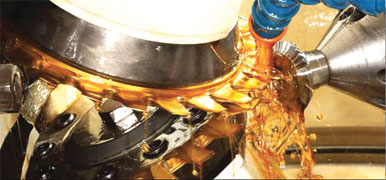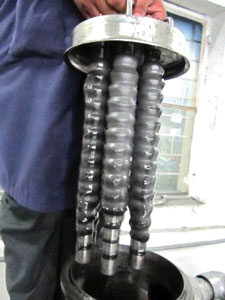Magnetic Filtration Saves the day
 Magnetic filtration can be used in almost any environment where ferrous and paramagnetic contamination of a liquid is a problem. In the metalworking and finishing world, this applies directly to the filtration of coolants and cleaning fluids. This environmentally responsible method helps fluids to retain their essential properties for extended periods and allows ferrous contamination to be collected for recycling. This filtration can also help efforts to increase a shop’s productivity. Because fluid does not flow through filter media, flow is uninterrupted. Even when the filter is full, there is no blinding or risk of burst filters that would cause downtime. Overall, magnetic filtration can lead to longer lasting fluids and lower operating costs. But beyond these benefits, this shop also notes that the process helped attain the surface finish that customers required.
Magnetic filtration can be used in almost any environment where ferrous and paramagnetic contamination of a liquid is a problem. In the metalworking and finishing world, this applies directly to the filtration of coolants and cleaning fluids. This environmentally responsible method helps fluids to retain their essential properties for extended periods and allows ferrous contamination to be collected for recycling. This filtration can also help efforts to increase a shop’s productivity. Because fluid does not flow through filter media, flow is uninterrupted. Even when the filter is full, there is no blinding or risk of burst filters that would cause downtime. Overall, magnetic filtration can lead to longer lasting fluids and lower operating costs. But beyond these benefits, this shop also notes that the process helped attain the surface finish that customers required.
Case Study: Carbide Cutting Tools are a leading manufacturer of carbide cutting tools for metalworking. The plant operates 24 hour per day. At this site, neat cutting oil is held in an individual tank, then delivered to a contact point and re-circulated via a cartridge filter. Previous filtration system was inadequate to filter sub micron particles. Resulting particles down to 10 micron continued to be circulated. Result - a buildup of particles around the grinding wheels which had a damaging effect on the surface of the tool. Production rejection rates were high. Carbide particles were also causing other problems like damage to the pump.
 The problem was that the fine ferrous contamination in the lubricant was causing damage to the drills, resulting in inaccurate drilling performance and frequent drill replacement, increasing tooling costs. A central filtration system was not an option because of the layout of the machine shop. Each machine had to be stopped for approx. 4 to 6 hours once a month to clean the carbide deposits from the tank. This was leading to downtime of 6 hour per month.
The problem was that the fine ferrous contamination in the lubricant was causing damage to the drills, resulting in inaccurate drilling performance and frequent drill replacement, increasing tooling costs. A central filtration system was not an option because of the layout of the machine shop. Each machine had to be stopped for approx. 4 to 6 hours once a month to clean the carbide deposits from the tank. This was leading to downtime of 6 hour per month.
Magnetic filtration was installed on to a Walter grinding machine along with the existing filtration system. The filter unit now extracts 2 kg of carbide particle every week. Removing these particle ensure consistent finish and dramatically reduce the rejection rate. In addition, a lot of savings were generated by reducing the number of pump replacements and increased the life of existing filter. Fluid life has also increased by approximately 40 %. Now there are no deposits of carbide particles in tank, and there is no downtime. After being satisfied with the results obtained by the first fitment of the magnetic filter, they have installed another 3 numbers on each of the grinding machine.
As carbide tooling has gained popularity, filtration consideration for this hazardous waste has grown. Through the selection of correct filtration systems, the following benefits are realized: improvements in tooling life, machine life and productivity; the reduction in maintenance, coolant consumption and hazardous waste disposal costs.
